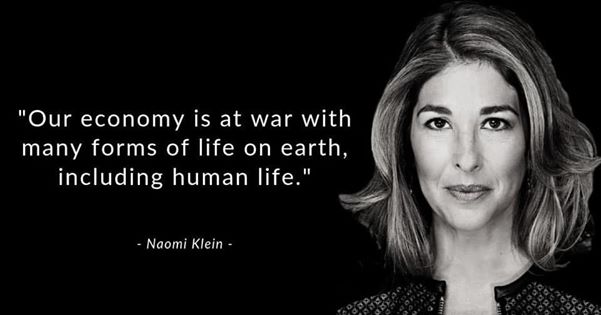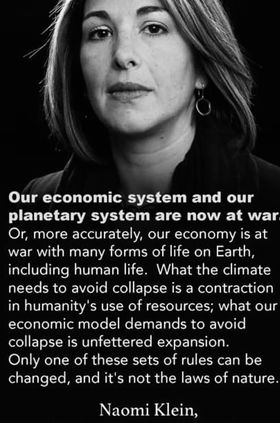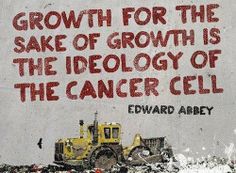
Business as Usual
The love of money has been called the root of all evil. It is certainly the root cause of many of the socioeconomic and ecological injustices we are facing today in a savage system of violence and strategic slavery. Our current economic model is known as growth economics or growth capitalism. In this model nature itself is an externality. It is also being called zombie or disaster capitalism, further discussed in Naomi Klein’s book “The Shock Doctrine,” in war inc.
Because of its heavy reliance on endless growth, neoclassical economics has become a significant biosphere stressor. It is clear that infinite growth on a finite planet will not work. This conundrum has not been solved by proposals of sustainable growth (video) either. If we are to alter our current trajectory toward a Hothouse Earth in the Anthropocene — in which great theorists such as James Lovelock have predicted more than 6 billion human deaths by the end of the century, we will need to discuss how to make our economy ecological. our current economic framework known as neoclassical or limitless growth economics.
What is Economics?
Economics is the study of the allocation of scarce resources. According to the American Economic Association, “it’s the study of scarcity, the study of how people use resources and respond to incentives, or the study of decision-making. It often involves topics like wealth and finance, but it’s not all about money. Economics is a broad discipline that helps us understand historical trends, interpret today’s headlines, and make predictions about the coming years.” In terms of climate change the predictions are dire and the changes needed radical. Yet we continue to fail to connect the dots. Meanwhile, 200 species a day and countless forests fall like extinction dominoes.
“Forget everything you think you know about global warming. The really inconvenient truth is that it’s not about carbon—it’s about capitalism. The convenient truth is that we can seize this existential crisis to transform our failed economic system and build something radically better. In her most provocative book yet, Naomi Klein, author of the global bestsellers The Shock Doctrine and No Logo, tackles the most profound threat humanity has ever faced: the war our economic model is waging against life on earth.” – This Changes Everything
Neoclassical or Limitless Growth Economics
There are many types of monetary systems. The most common type used globally is fiat money (defined as government-issued currency that is not backed by a physical commodity, such as gold or silver, but rather by the government that issued it). The US Petrodollar is fiat money. The current system of fiat money is informed and governed by specific branch of economic principles called neoclassical economics, growth economics or growth capitalism. Neoclassical economics is often defined as an approach to economics focusing on the determination of goods, outputs, and income distributions in markets through supply and demand.
It has also been referred to as trickle-down or supply-side capitalism. This follows the theory that what’s good for the wealthy will trickle-down to everyone in the society; not that this happens. Supply-side is the opposite of Keynesian theory which conversely has demand as it’s primary driver. Erik Britton uses the popular game Monopoly as a thought experiment on how banks and money work in our economy, revealing the conflicted nature of banking in the real world. Aspects of the mathematics of neoclassical economics have underpinnings in Game Theory.

Game Theory is used in the concept of Mutually Assured Destruction (MAD). It is a solution to the famous Prisoners Dilemma Game which made Game Theory famous for its application during the Cold War.It’s also the plot of a classic movie: Dr Strangelove. “Game Theory is a circular logic about what I will do given what you will do given what I will do. Once the mystique of high mathematics is stripped away and the nature of Game Theory is made clear, we find it to actually be a very simple idea…” says Brendan Markey-Towler. But is an idea that also ultimately strips reality (like the physics of climate change and other complex externalities) out of the equation and replaces it with a grandiose delusion of control through infinitely manipulated sequences of circular logic and inherent bio-chauvinism. The outcome of the film, Dr. Strangelove, can be seen as a criticism of using game theory when the risks are too large. It is essentially a predatory zero sum game. In this segment of the Keiser Report (video), Max and Stacy discuss illogical and crazy negative interest rates as evidence of kleptocracy (also sometimes referred to a zombie capitalism) and why it is also a good reason to ‘get off zero’ in relation to bitcoin.
“Classical economic theory promotes laissez-faire policy. It says the free market allows the laws of supply and demand to self-regulate the business cycle. It argues that unfettered capitalism will create a productive market on its own…In this theory, business owners (…) maximize profit [at all costs].” – The Balance
In laissez-faire capitalism the business sector is largely free from government intervention in their transactions, such as tariffs and regulations. In fact, most large corporations are so free from regulations of any kind that they rarely pay taxes. The fox is in charge of the proverbial hen house. Koch Brothers, other large corporate Fortune 500 interests, and oil oligarchies now control government agencies. In this video, well-known economist Richard Wolf discusses capitalism run wild. Nancy MacLean’s book, Democracy in Chains also discusses this. For more education and background on our current economic system and how it works, please visit The Great Courses.
“As the philosopher Michael Rowan points out, the inevitabilities of compound growth mean that if last year’s predicted global growth rate for 2014 (3.1%) is sustained, even if we miraculously reduced the consumption of raw materials by 90%, we delay the inevitable by just 75 years. Efficiency solves nothing while growth continues.” – George Monbiot
So, you might ask is the problem our capitalism or our economic policy? The problem is both. They are intertwined. Our adoption of growth capitalism, it’s subsequent economic policy and it’s inherent neoliberalism have simply stopped working for habitat and for humanity. This system is in need of reform, revision and revolution.
“One cannot change an existing system; one must create a new system that makes the old system obsolete.” – R. Buckminster Fuller.
Limitless Growth Without Reason or Account
In mainstream economics (limitless growth economics) the entire natural world is an externality. This means that destruction of it is not a factor, because it simply doesn’t exist on paper. Money is turning the natural world into more money as fast as it possibly can. Self-interested profiteering over all else is how the current system operates. This means it’s every man for himself and the only game in town is the bottom line. Maximizing profit must come at any cost and often does. This is just the beginning of the problem with this paradigm.
For the elite ruling class there will never be enough wealth accumulated because it is after all a limitless growth economy — never mind the finite planetary resources. In order to be the top dog in the limitless growth economy game, a rich man must always get richer, and have more than the next guy. The competition is minute to minute. It becomes an addiction.
Many analysts and scholars are calling out the abuses of this corrupt capitalism now in power globally. US Senator Bernie Sanders of Vermont has spoken to the Pope about these abuses of capitalism. Additionally, Noam Chomsky (video) and Chris Hedges (video), notable scholars, authors and speakers of our time are discussing how our societal illusion of democracy is now hiding a predatory corporate totalitarianism backed by growth economics schemes. Thom Hartmann has said that the madness of the morbidly wealthy (video) we call the elite ruling class, is ruining our planet.
Chris Hedges, who says “I don’t fight fascists because I’ll win, I fight them because they are fascists,” is calling for an overthrow of this corporate totalitarianism. Despite our inertia and complacency as a society bent on free market mythology, we must begin to find the end of this destructive, predatory installment of capitalism.
Free market mythology (video) says Ralph Nader, is an educational tool which has led to this state of corporate totalitarianism. We believe that we have free market capitalism, but we do not. Many scholars and researchers are now reporting that we actually have an unhealthy, apparently undead version! According to Henry Giroux, PhD we have adopted a dysfunctional, malicious, and predatory” zombie capitalism.” He argues that in fact free markets, can and do exist without capitalism. Even though we believe that our current system is the only form of capitalism, it is not. It is a flawed interpretation that is now outdated and greatly in need of overhaul and reform at the very least.
A Flawed Operating System: GDP & Profit Over Planet
Simon Kuznets, the inventor of Gross Domestic Product (GDP), said when he presented it in the US that this should not be seen as an ultimate measure of an economics, and that later we should continue his work toward finding a more complete model. As a society, we ignored and quickly forgot this warning.
Also, in the beginning there was an assumption that GDP would be used as a measure within the context of a moral compass and a larger ethical framework. However, at some point we have lost any semblance of this ethics as a society. Businesses were originally meant to serve society; with profit as a consequence of this service. But now we have this completely backwards. We must return to a core business model that is philanthropic and ecological, because after all you can’t, breathe, eat or drink money once the air, land and water are all polluted for profit.
“Humans evolved within a lush and vibrant Eden teaming with life, which until just a few generations ago provided for natural abundance and the prospect of perpetual human existence. We are one of many species utterly dependent upon natural ecosystems for all needs including air, water, food, and shelter.
The rise of ecological colonialism and the industrial revolution changed all that, as million year old naturally evolved ecosystems became fodder to be liquidated and consumed for accumulation of paper wealth. The disambiguation of buying our needs with money has led us to deny our ecological nature.
For two centuries humanity has waged an unrelenting war upon nature. Ecological habitats and their wildlife residents have been slaughtered incessantly. Entire species have been wiped out, as their members have been burnt, shot, tortured, and left to starve. Whole ecosystems have been dismantled to create consumer crap that is quickly thrown away.” – Dr. Glen Barry
Our notion of GDP is incomplete and dangerous. It has become extremely harmful to the biosphere we rely on for life and is now threatening us with extinction. Planned obsolescence is a good thing for GDP. But a bad thing for ecology, ecosystems and people.
In short, the elite are corrupt and now have achieved unregulated and unfettered power. As we know absolute power corrupts absolutely. They are addicted to the game of money. This is similar to the psychological disorder we know as hoarding or gambling addiction at a sociopathic level. The obscenely wealthy are playing a game of monopoly with our lives and the life of the planet in order to win at an imaginary game of wealth that is only capable of being self-interested and purely profit motivated. Some have also said this is exactly what happens when you take Randian principles seriously. Milton Freidman also advanced this ideology.
Further honest workers, countless lifeforms, and all life on earth becomes a pawn in a criminal elite monopoly game. Some have also called limitless growth the biggest ponzy scheme on the planet. Amazon, for example, is now similar to a nation-state controlling global interests. Jeff Bezos could end world hunger (video), says Jimmy Dore and yet Amazon employees need to work multiple jobs, are often forced to apply for food assistance from the public and cannot access healthcare in the country where they live and work.

Reform & Degrowth As Antidotes
The only question remaining is what’s next, reform or revolution? Many say start with reform. Climate change is a direct result of how our current model of capitalism fails to value nature. Worldwide impacts of anthropogenic climate disaster continue to intensify, corporations and the global elite continue to plunder our planet, subjecting areas of the planet that already face tragedy to still greater risks. Therefore, we must reclaim and redefine economics through reform. One way to reform our current system is to implement the opposite of growth which has been proposed as degrowth. Jason Hickel has been writing and presenting on this topic for sometime now in the environmental movement. He says “less is more.”
In short, degrowth is a policy of reducing levels of production and consumption within an economy in order to conserve natural resources, minimize environmental damage, and become truly sustainable. Degrowth strategists critique the global capitalist system which pursues growth at all costs, causing human exploitation and environmental destruction through extractivist colonializing and imperialist methods. This is the topic of books such as Late Victorian Holocausts, Debt: The First 5000 Years, and other seminal tomes such as Manufacturing Consent.
Sustainable businesses aim to reduce their environmental footprint through initiatives that cut down on waste, inefficiency, toxicity, poor environmental stewardship and other unethical or detrimental practices. They can also scale down on their enterprises, let workers work less, and ensure that jobs are not what the late David Graeber called BS Jobs. As identified by Scientists’ Warning Advisory Board Member Victoria Hurth, sustainable governments, businesses and organizations must adhere to the following 5 principles. They must:
1) serve a social purpose,
2) provide excellent governance,
3) support culture,
4) produce life enhancing marketing,
5) and; present sustainable leaders to the world that serve as steward’s of the biosphere.
What About the Green New Deal (GND)?
A Green New Deal has been proposed to bring change. But many are still skeptical. The Green New Deal (GND) — a term purposefully reminiscent of Franklin Roosevelt’s original New Deal in the 1930s, has gained a lot of following by progressives. It refers, in the loosest sense, to a massive program of investments in clean-energy jobs and infrastructure, meant to transform not just the energy sector, but the entire economy.
It is meant both to decarbonize the economy and to make it a fairer and more just society by addressing healthcare and education related concerns. It may be a step in the right direction, but critics are already saying we are going to need stronger reform than this to get off of fossil fuels and save the future. One critical question is why doesn’t it push for a carbon tax? Critics are already saying it will be too little, too late. Still, most agree that it would be better than where we are now.
In this video discussing the Green New Deal (video) Tom Goldtooth of Indigenous Environmental Network says “the earth, air and water have rights too.” Tom Goldtooth also says that a Green New Deal must reject corporate takeover and rather, center on indigenous and front line communities.
One significant hurdle for a GND is that is would require an entirely different mindset and approach from the growth paradigm. If GND is put in place within the current system it is likely that it would only become more another way for corporate interests to greenwash with “net zero” scams that do more harm than good.
Energy Innovation and Carbon Dividend Act of 2018
For decades many Americans have asked members of Congress to work to solve climate change with bipartisan legislation. One climate solution introduced in 2018 is senate/house bill S. 3791 / H.R. 7173. This policy is attempting to drive down America’s carbon pollution while unleashing American technology innovation and ingenuity. Many support it because it’s the:
► first bipartisan climate bill in a decade
► most aggressive U.S. legislation ever introduced
► only plan on track with the IPCC drawdown targets:
->40% GHG drawdown by 2030
-> 90% GHG drawdown by 2050
-> 2M+ new jobs in first 10 years
There is also of course a downside. Since the carbon tax was introduced, wholesale electricity prices in the National Electricity market have increased significantly. In some countries, like Australia, it resulted in the largest energy corporations in the oil oligarchy offsetting the bill to regular folks that forced many out of their housing, while these corporations continued to receive subsidies and tax breaks. The Energy Users Association of Australia in its June 2013 paper said that electricity generators have been able to pass through more than 100% of the cost of the carbon tax. It was repealed in 2014 due to failure.
Other countries that have a carbon tax include Norway, Sweden, Canada and others. Perhaps at the very least the increased costs to consumers will stimulate and incentivize the choice to go off grid or choose alternatives like wind and solar.
Revolution
Ecological economics has long been touted as an antidote to growthism. Many are discussing an ecological civilization that would put in place an economic model based on ecological principles. In this economics the goal would be to take scarce resources, which must be protected, and allocate them to create well-being for society and the biosphere we live in. This is the true basis of genuine sustainability ethics. This would elevate nature over profit. There are many forms of this such as socialistic capitalism, natural capitalism, and even some completely currency free paradigms now being debated.
It is possible to have growth says Phillip Lawn, Research Scholar at the Global Institute for Sustainable Prosperity, within ecological frameworks by increasing quality and decreasing quantity. Furthermore, according to Phillip Lawn, “a successful economy is one that increases the well-being of a nation’s citizens in an ecologically sustainable and equitable manner. Empirical evidence indicates that growth is now failing to augment the well-being of people in countries with high gross domestic product because it increases costs faster than benefits. More disconcertingly, biophysical indicators reveal that high-GDP economies are well beyond the ecosphere’s capacity to sustain them. While growth was a successful strategy for high-GDP countries during times when their economies were small relative to the containing ecosystem, this is no longer the case.”
Adopting this model across many platforms could lead to a real revolution. Many aspects could be put in place immediately. In fact, some groups and nations are already using these principles. We should study GNH as the Bhutan model has long shown success with. Ultimately, we will need to end our addiction to a growth economy and choose a new ecological and sustainable model despite our current society’s inertia, fear of change, and addiction if we are to survive.
Summary
It is clear that it is time to either reform or revolutionize our monetary and economic systems. We cannot continue with business as usual and we must relinquish GDP and neoclassical economics. We are not moving fast enough, but the first foundations for the potential for fundamental shifts are now beginning to appear.
Pressure from a large range of stakeholders, including businesses themselves are arising. It is now clear to many that we have a burning platform seeking reform. Business, trade, economy are at the heart of this matter. We can’t transform without businesses, regulation, legislation and systemic action from the top down. Of course, we must also work from the bottom up to change how we consume and decrease our demand for stuff.
Many are now saying that we need a revolution. The current economic system must be reformed or revolutionized before we lose our biosphere and thus our habitat. Simply put, we must end our addiction to growth before it ends us.
Here is a list of several resources addressing ways of ending our addiction to growth:
- How to Kick the Growth Addiction
- Moving from a Failed Growth Economy …
- Choose Planet over Profit | Truthout
__________________________________________________________________
How to Get Off Growth:
- Peaceful Civil Disobedience
- Lawsuits v Government and Bad Actors (video)
- Adopt Ecological Economy/Sustainability
- Ditch GDP
- Boycott Fortune 500
- Worker Co-Ops, Strikes and Unions
- Medicare For All
- Universal Basic Income (video)
- Envisioning a World Without Money
- The Connection Between the Economy and the Environment (video)
__________________________________________________________________
Learn More:
- SW Ecological Economics Knowledgebase
- Bio-chauvinism is the Lifeblood of our Failed Economic System
- The Wolf of Wallstreet and The Libidinal Economy | Al Jezeera
- Libidinal Economy, Prostitution and Consumer Culture
- Staying with Trouble | Donna Haraway
- The Argument that Capitalism is Natural and There is No Alternative? | The Guardian
__________________________________________________________________
References:
|
__________________________________________________________________
Last Updated: 06/19/2021






